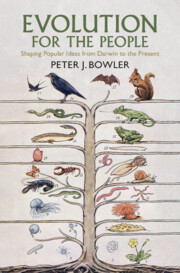Book contents
- Evolution for the People
- Evolution for the People
- Copyright page
- Contents
- Figures
- Preface
- 1 Bridging the Gap
- 2 Before Darwin
- 3 Reacting to the Origin
- 4 Human Ancestry
- 5 Evolutionary Epics
- 6 Challenging Darwinism
- 7 Reconfiguring the Ascent of Life
- 8 Social Evolutionism
- 9 The Evolutionary Synthesis
- 10 Toward the Modern World
- Bibliography
- Index
8 - Social Evolutionism
Published online by Cambridge University Press: 21 November 2024
- Evolution for the People
- Evolution for the People
- Copyright page
- Contents
- Figures
- Preface
- 1 Bridging the Gap
- 2 Before Darwin
- 3 Reacting to the Origin
- 4 Human Ancestry
- 5 Evolutionary Epics
- 6 Challenging Darwinism
- 7 Reconfiguring the Ascent of Life
- 8 Social Evolutionism
- 9 The Evolutionary Synthesis
- 10 Toward the Modern World
- Bibliography
- Index
Summary
Several versions of ‘social Darwinism’ flourished in the late nineteenth and early twentieth century, along with ideologies derived from non-Darwinian evolution theories. They exploited discoveries of fossil hominids including Neanderthals and the Piltdown fraud to construct rival explanations of the emergence of human characteristics that might shape social development. The linear hierarchy of races erected in the nineteenth century remained the basis of many popular accounts, even though professional anthropologists began to turn their backs on it. Ideologies based on national or racial competition were advocated even by writers who did not accept the Darwinian theory of competition within populations. Fear of racial degeneration fuelled the eugenics movement’s calls for the elimination of ‘harmful’ characters, although the input from genetics encouraged an analogy with artificial rather than natural selection.
Keywords
- Type
- Chapter
- Information
- Evolution for the PeopleShaping Popular Ideas from Darwin to the Present, pp. 186 - 216Publisher: Cambridge University PressPrint publication year: 2024

